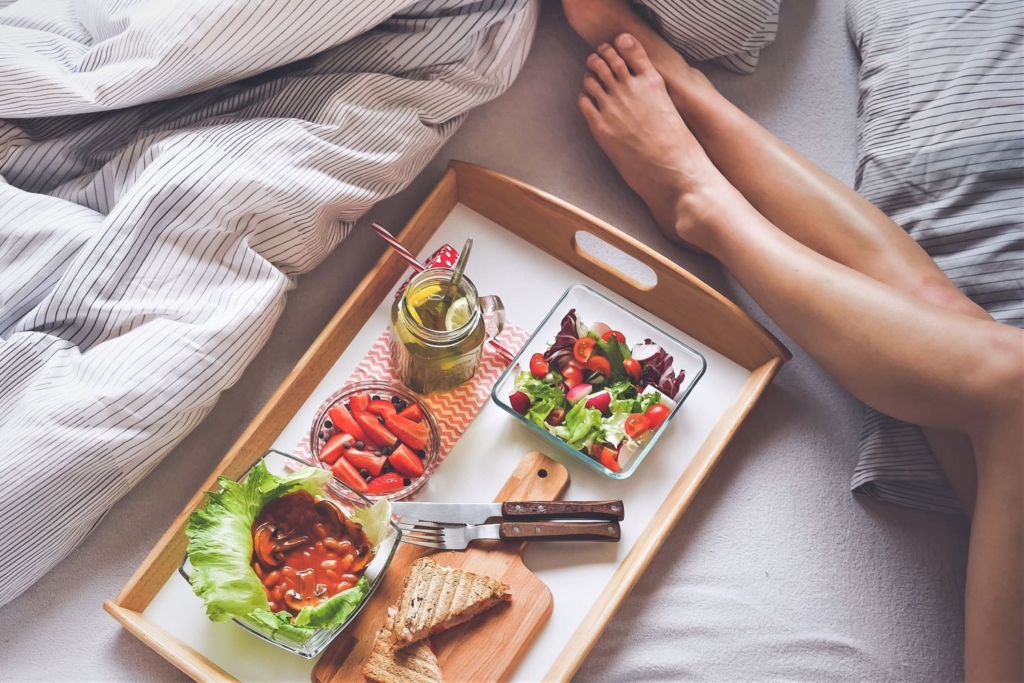Eating a healthy diet is essential to prevent or slow the development of varicose veins. While the foods we eat will impact all of our internal functions, there are specific goals when looking at vein health and maintaining vein function:
- Supporting blood vessels and capillaries
- Improving blood circulation
- Minimizing additional pressure on veins
IDEAL NUTRIENTS FOR VENOUS INSUFFICIENCY

Veins are best supported by a diet rich in omega three fatty acids, antioxidants, and essential nutrients. The most influential nutrients that support vein health and help prevent varicose veins are:
Fiber – prevents constipation, which increases pressure on the veins and can contribute to varicose vein development. Fiber also manages cholesterol levels and blood pressure.
Rutin – a flavonoid that is vasoprotective (protects blood vessels), anti-inflammatory, and antithrombotic (protects against blood clots). Rutin has been shown to help lower cholesterol and blood pressure, while strengthening weak capillaries to prevent varicose veins.
Vitamin B3 (Niacin) – helps lower cholesterol and support circulatory functions
Vitamin C – improves circulation, reduces inflammation, strengthens blood vessels and defends against free radical damage
Vitamin E – improves blood flow and can protect against blood clots and Deep Vein Thrombosis (DVT)
BEST FOODS FOR VEIN HEALTH
For anyone concerned with vein health, a diet rich in the foods that offer these nutrients will offer the best prevention for varicose veins. Some of the top performing foods for vein health include:
Water! – Hydration is essential to all internal organs and is key to maintaining healthy veins. Not only does being hydrated promote optimal blood flow, but drinking at least one half gallon of water per day will also help flush out waste and soothe symptoms of venous insufficiency.
Avocados – high in vitamins C & E, and rich in glutathione, which helps protect arteries, veins, and the heart from oxidant damage
Apples – high in rutin and fiber, and have been shown to lower cholesterol and blood pressure
Asparagus – rich in Vitamins A, C, E, and K, as well as folate, fiber, chromium, calcium, niacin, phosphorus and amino acids. Helps prevent rupturing in capillaries and veins.
Beets – rich in nitrates, which can support blood vessels, improve circulation, and lower blood pressure. Beets also contain betacyanin, a compound that can drastically lower levels of the amino acid homocysteine, which can harm blood vessels
Blackberries – high in rutin, and can help strengthen veins & capillaries, improve arterial function, and protect against blood clots
Black Olives – high in rutin and antioxidants
Buckwheat – high in rutin, protein and fiber, improves blood flow and circulation
Chia Seeds – high in fiber, prevents bloating to avoid additional pressure on veins
Ginger – anti-inflammatory, helps improve circulation and dissolve fibrin in blood vessels, which causes veins to harden and become lumpy
Grapes – high in rutin, and can relax blood vessels, reduce hypertension, and help prevent blood clots
Kale and Collard Greens – high in potassium & magnesium to help manage blood flow
Raspberries – high in rutin, vitamin C, and antioxidants
Rosemary – promotes healthy blood circulation and contains rosmarinic acid, a compound that can help prevent free radical damage to tissues
Watercress – rich in antioxidants, and offers over 300% of daily recommended Vitamin K, and high in B1, B2, B6, C, E, manganese, carotenes, iron, calcium, copper and fiber
WORST FOODS FOR VARICOSE VEINS
Just as healthy foods with the right nutrients can boost vein health and help prevent varicose veins, there are several foods that worsen vein function.
Patient with risk factors for venous insufficiency, and/or showing symptoms of varicose veins, should avoid:
Sodium – Consuming more than 2300 mg of sodium per day causes fluid retention, which adds pressure to the veins and increases the likelihood of developing varicose veins
Sugar – Consuming more than 36g of sugar (for men) and 25g of sugar (for women) contributes to weight gain and diabetes, a known factor for vein disease
Fried foods – heavy in saturated fats, which clogs the arteries and restrict blood flow
Dairy – slows down the digestive system, can cause constipation which enables vein swelling
Processed meats – high in sodium, causes water retention which restricts circulation
Alcohol – dehydrates the venous system, slowing circulation
CAN I TREAT MY VARICOSE VEINS THROUGH DIET?
A healthy diet has a positive effect on vein health in many ways; it can boost vein function, help prevent the development of varicose veins, and soothe existing symptoms of varicose veins.
However, diet alone cannot treat or remove the presence of varicose veins.
If you have varicose veins and are interested in learning more about varicose veins treatment options, simply fill out our Online Appointment Request Form or call any of our clinics in Northwest Portland , Tigard, Happy Valley, Hillsboro or Bend, Oregon.